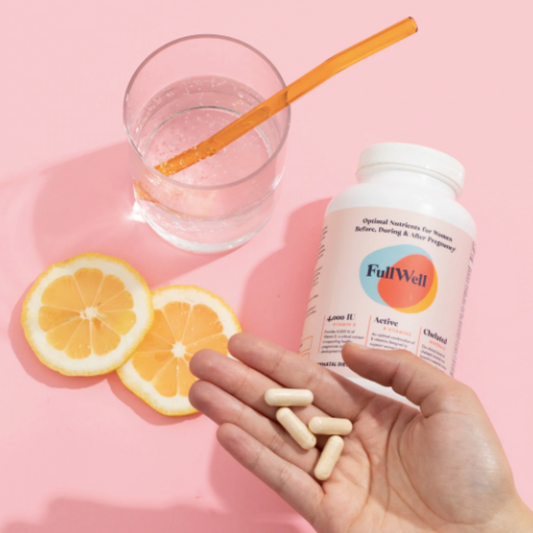The Choline Chronicles: Why It's Important to Get Enough Choline During Pregnancy
Read more

You’ve done your research, and you’re looking for the best in Bs in all of the supplements you’re taking. You might not completely understand why, but you know that B vitamins are a critical component in supporting conception, pregnancy, and breastfeeding.
In my private practice, I often hear from clients who have been advised to look for a supplement with "methylated B vitamins" (often referred to as "active B vitamins"). This is excellent advice! But understanding why and diving into the research and reasoning behind that advice is essential.
Especially during pregnancy and while breastfeeding, I challenge you to look for the most bioavailable form of B vitamins you can get your hands on. Why are bioavailable Bs so important? Let’s take a closer look.
“Bioavailability” is the readiness with which a food or drug can be absorbed into the bloodstream.
High bioavailability = very easily/quickly absorbedLow bioavailability = ...not so much
When something is not bioavailable, it is perhaps in a form that must be altered or converted to another form to become more readily used. The extra step (and sometimes steps) involved in that conversion causes the body’s metabolism of the nutrient to be much slower and less efficient overall. Not ideal, especially during pregnancy when your body is working hard to make an entirely new human being.
In the case of vitamin B12 and folate, the methylated forms do not require a pivotal enzyme to restructure them and make them more bioavailable, making them more inherently efficient. This is good news because many people have a MTHFR genetic SNP variant, making it difficult to produce sufficient amounts of the enzyme needed to convert non-methylated forms.
All of us possess a gene called 5-methyltetrahydrofolate, commonly abbreviated to MTHFR (I know it looks odd, bear with me). MTHFR stands for methylenetetrahydrofolate reductase, an enzyme that plays a role in processing amino acids. In the case of B vitamins, it converts non-methylated forms into more bioavailable molecules that are quickly put to work in the body. Specifically, MTHFR is responsible for the breakdown of folic acid (B-9), which creates folate. Folate plays an important role in red blood cell formation and is vital for healthy cell growth and function.
When someone possesses a MTHFR genetic SNP variant (which is not entirely uncommon), their body has a hard time making the methylenetetrahydrofolate reductase needed to convert non-methylated B vitamins into more easily processed forms. A less efficient MTHFR gene results in an inability to produce enough MTHFR, which causes low folate levels and other vitamins in the blood. This can put expectant mothers at risk, especially in the first few weeks of pregnancy, as it plays a vital role in creating red blood cells and helps baby’s neural tube develop into the brain and spinal cord.
With highly bioavailable, methylated B vitamin varieties, the extra step that requires methylenetetrahydrofolate reductase is eliminated or reduced, making the process more efficient and, therefore, better for the population at large. After all, how many of us know the status of our MTHFR? Unless you’ve run some pretty comprehensive lab work with your doctor, there’s no way to tell whether or not your DNA holds this variant. That’s why supplementing with methylated B vitamins is so important.
FullWell Prenatal expertly combines methylcobalamin, adenosylcobalamin, and methyltetrahydrofolate with calcium folinate (folinic acid) to provide enough active B vitamins while also reducing side effects that affect tolerance.
When it comes to B Vitamins, you can have too much of a good thing.
While B vitamins can support mood, sleep, and reduce pregnancy-induced nausea, flooding the body with high doses can have serious consequences. Over methylation can lead to increased anxiety, which I’ve experienced firsthand from working with expectant mothers in my private practice as a Registered Dietitian and functional nutritionist. Women don’t need extra stress while pregnant and are already going through so many physical, mental, and emotional changes, so this is one of the first things I addressed while creating FullWell.
I formulated FullWell with folate, B-12, and B-6 in highly bioavailable forms that have been widely researched (safety first, always). When you take your FullWell Prenatal Vitamins, you are ingesting your B vitamins in the most accessible forms to digest, absorb, and utilize, and get an ideal amount and balance to support your growing baby without experiencing any of those above-mentioned unnecessary side effects.
Based on my research and experience, I chose to avoid folic acid, opting instead to combine methylated forms (methyltetrahydrofolate, the methylated form of folic acid) with other active forms (calcium folinate) to increase tolerance and avoid overdoing it.
The blend:
The above provides a highly bioavailable supplement combined with specific ratios of non-methylated forms to strike the right balance and avoid overmethylation.
Ok, so you now understand why quality and form matter, but I’ve only scratched the surface on quantity concerning pregnancy.
B vitamins are water-soluble and rely on optimal digestive functioning to be absorbed well. Research shows that only about 10 mcg of a 500 mcg oral Vitamin B12 supplement is actually absorbed in non-pregnant, healthy people. This is one of the reasons why FullWell Prenatal's B-12 levels exceed the percent daily value for the average, non-pregnant person. (It's worth noting that some studies show that vitamin B-12 intake in pregnancy should be at least triple the current RDA.)
More than half of all women have suboptimal levels of vitamin B-6 at delivery. So, while the balance of forms is essential, it is incredibly challenging to overdo it on B vitamins while pregnant.
When it comes to your diet, B vitamins are most abundantly found in animal foods. Animal-based products provide vital nutrients that cannot be found anywhere else, so I am a proponent of incorporating them into my clients’ diets and lifestyles when I work with them one-on-one.
Remember that food safety during pregnancy is imperative to protect the health of both mom and baby and manage pesky food-related symptoms.
Vegans or vegetarians should be vigilant about vitamin B intake, making informed, wise supplementation choices. However, avoiding animal products doesn’t mean you can’t make a valiant effort to consume B’s through your diet.
Vegan and vegetarian mamas will need to focus on eating

B vitamins are essential for maintaining physical strength during pregnancy and supporting the baby’s development and growth. Getting enough B12 helps:
Breastfeeding mothers also benefit from enough vitamin B12 since it can be transferred through breast milk to breastfed babies. This is essential and needed for baby’s overall growth and development.
Lastly, I’d like to address concerns on recent research that has linked high vitamin B-12 intake to autism in children. This is a question that I’ve been asked a lot, and for a good reason. The main thing to know is that in these studies, the form of vitamin B-12 was cyanocobalamin. After reading this blog post, you now know why the form of the nutrient matters so significantly! We do not use cyanocobalamin (which requires enzyme-facilitated conversion in the body) in FullWell Prenatal. It is also worth noting that these studies show a correlation but are far from definitive. Many factors and variables we do not yet know or understand likely lead to autism. The very best you can do is keep your body well nourished with optimal forms and doses of nutrients.